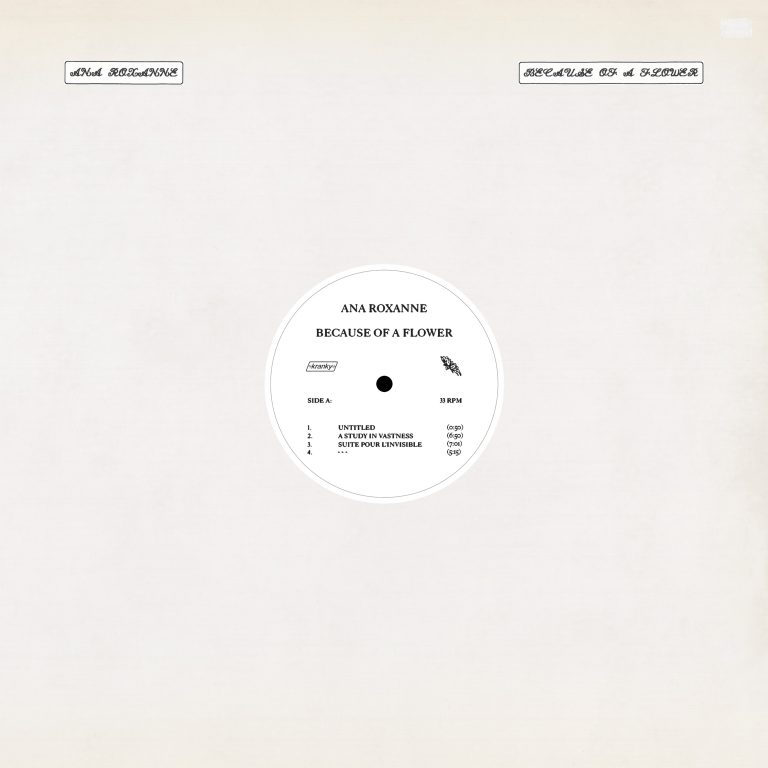Californian musician Ana Roxanne’s star has been rising, steadily but slowly, over the past few years. A mix of perfect timing, word of mouth, and internet buzz has allowed her work to usher itself into the blogosphere with a sort of graceful momentum. Of course, it helps that her music has been as intriguing as it is: on her 2019 album, ~~~, Roxanne’s penchant for textural, spacious, ambient pieces with just a whisper of pop was clear, her compositions projecting various moods and tones across their watery passages.
On her full-length follow-up, Because of a Flower, Roxanne takes the building blocks of her earlier work, which sometimes felt a bit too sparse, and brings them to new heights. The seven pieces that make up this album range from 51 seconds all the way to eight minutes. Beginning with “Untitled”, an austere spoken-word piece that gets more and more divided and affected as it moves on, Roxanne then proceeds to give us almost 40 minutes of beautiful, yawning soundscapes; moving, often wordless vocal melodies; and a range of textures.
“A Study in Vastness” begins with a low drone, equal parts eerie and serene, as Roxanne’s voice unfurls over it. She loops her voice as both a subtle rhythm section as well as a yearning lead, calling out like a lone hiker across the mountains. It isn’t too dissimilar a toolkit from what Julianna Barwick uses – some voice, loops, and a healthy dose of reverb – and yet the effect is so strikingly different: where Barwick’s work often comes across as heavenly or deeply pretty, there is something unsettling about the soundscape Roxanne gives here, never quite settling, like an inkblot that’s slowly running around the page.
Right away, following track, “Suite Pour L’invisible”, comes from a different angle. Odd keyboards and guitars cross over each other, in thick plodding notes, like something out of an episode of Twin Peaks. It’s almost Grouper-esque, with its very noticeable room tone and gauzy colors, especially once more layers get added in. Roxanne’s voice strides in on high notes, like darts of sun, and it sounds eerily like something Liz Harris might conjure. Later, “Camille” upends all of it with the album’s first actual beat, lending a jarring but welcome shift to the tracklist. Roxanne’s melody on this song is entrancing, as the keys groan below her.
The lyrics are rarely discernible, but they really aren’t the point here; Roxanne’s careful touch with texture and sound, especially with effects and a couple of well-placed samples, are the stars. With a little more clarity and robustness, “Camille” would be an indie dream pop hit, but as it is, it’s more like seeing something through a thick fog, not sure what it is, equal parts curious and unnerved from this mystique. “Venus” is a bit adrift, quite literally, as Roxanne sings over water samples and ambling sonics, but it’s also one of the prettiest moments on the record.
The whole thing ends with “Take the Thorn, Leave the Rose”, which seems, at least spiritually, to be connected to Roxanne’s process of self-discovery and acceptance as an intersex musician. She has said that the flower itself, as a symbol, represents a sort of symbiosis, a dichotomy, that’s intrinsic to its existence. This closing track begins with some dark, dusky guitar chords, but midway through it splits itself in half, segueing (in a way that is somehow both graceless and also magical in its suddenness) into a second part, consisting of rain samples, a repetitive piano progression, and a lovely, featherlight vocal. It’s fuzzy, as if recorded on the fly, but it ends the album on a deeply warm note.
It is perhaps the most peaceful moment on a record that always feels remarkably still and yet untethered, elemental, and instinctual. And though it may be a bit brief or spare for some, Roxanne’s hand on her sound is tighter than ever. While it’s on, Because of a Flower gives us a glimpse into a very specific world of sound — aquatic, earthen, and airborne, all at once — and it is a treat to get lost in.

